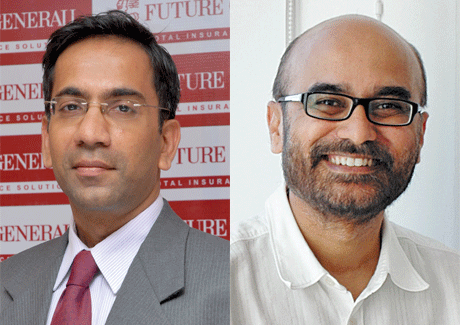Abraham Alapatt, head – marketing, brand and corporate communications, Future Generali India Insurance (L) and Ravi Deshpande, chairman and chief creative officer, Contract Advertising (R)
Does a brand get impacted when its face leaves?
AA: It depends on how powerful the association built between the face and the brand is. If significant investments of time, effort and money have gone into building this association, when the face exits, it certainly negatively impacts the brand.
RD: Yes and no. In the short term the celebrity who is attached to a brand starts to give it a particular look, feel and personality. So, when that celebrity leaves, the brand could feel a bit faceless for a brief period of time. But the world has a short memory. No one misses the celebrity once the brand starts communicating charmingly again. Association is good as long as it lasts. Then things move on. For instance, Aamir Khan had done an ad for Pepsi and then he went on to endorse Coke. It didn’t really matter to anyone. Now Aamir is no longer seen in Coke commercials, and Imran Khan is. But it hasn’t hurt Coke at all.
Does this happen both for a celebrity ambassador as well as a "corporate face"?
AA: Some corporate faces are very visible and at times iconic. Steve Jobs for Apple, Richard Branson for Virgin – or in the Indian context - KV Kamath for ICICI, Narayana Murthy for Infosys or Ratan Tata for the Tata Group. Corporate faces like these have tremendous stand-alone brand equity. Their leaving can have a similar effect to that of a powerful celebrity ambassador exiting a brand.
RD: When a corporate face leaves, the impact is truly felt when the person is more than just a face. He is missed if he has a deep impact on his own organisation. The most cutting-edge companies around the world are the result of a man’s vision. Everyone adapts sooner or later. Once everyone adapts and there’s a suitor who is as capable or even more capable, the show goes on.
What’s the best way for a company to deal with such a situation?
AA: Companies need to take a stance on celebrity endorsements because it is a double-edged sword. If the brand invests in using a traditional celebrity or using an in-house celebrity (CEO/promoter) they need to ensure that at no point does the celebrity-endorser become larger or more visible than the brand or brand message. If this happens over a sustained period of time, the brand can become a hostage to the celebrity endorser. One should be careful about using celebrities. One has to be very real about measuring rupee/recall ROI (outside of celebrity-led recall) for the brand and beyond the term of engagement. The celebrity should help the brand get ahead not the other way around. Choosing celebrities in line with your brand-idea rather than trying to force fit your brand idea around a pre-decided celebrity is a good way of ensuring that the celebrity never overshadows the brand idea.
RD: It depends on the company. Some highly innovative companies are really the work of a tightly-knit team led by a visionary. Once the vision is ingrained within the psyche of the employees and stake holders, it doesn't matter. The vision becomes the face of the company. But it's that journey during the formative years when a company is a promising fledgling to a stage where it's an innovative brand. As for the benefits, the brand becomes associated with that face. And so by that logic, it's easily recognisable.
How likely is the loss of a valuable client after the brand’s face leaves?
AA: In the case of a celebrity endorser – this is very unlikely. In the case of a celebrity CEO/promoter leaving– (Jobs and Apple as a case in point) falling stock prices and loss of investor/customer confidence is entirely possible unless the incumbent steps up to the challenge and demonstrates his/her capability to carry forward the legacy
RD: It depends on what life-stage the brand is at. The brand has to reach a stage where its strategy and operations are firmly in place. Once that’s accomplished, everything should be fine. Having said that, it’s important to keep reinventing the brand and constantly churning out new, exciting solutions.

